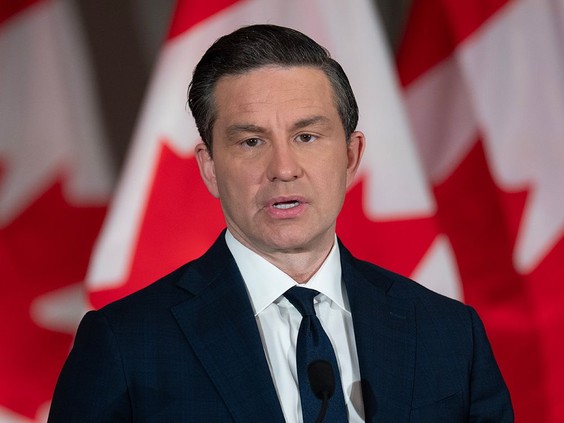World
Poilievre Advocates for Ending DEI Programs in Canada

Pierre Poilievre, leader of Canada’s Conservative Party, is pushing to end government initiatives focused on diversity, equity, and inclusion (DEI). He argues that eliminating these programs would allow for the selection of candidates based on merit and character rather than identity factors. This statement aligns with the views of Mark Milke, founder of the Aristotle Foundation for Public Policy, who asserts that such initiatives can lead to discrimination based on skin colour, gender, or ethnicity.
Milke, speaking to the *National Post*, emphasized that the core question is about the type of society Canada aims to create. He stated, “Governments should not have bureaucracies whose job it is to discriminate based on skin colour, ethnicity, gender.” Poilievre has called upon Canadians to support his petition to abolish DEI programs, which he claims are a misuse of taxpayer funding.
In a post on social media platform X, Poilievre declared, “End DEI. Restore the merit principle.” He criticized the Liberal government for what he described as “bloated” DEI bureaucracies costing taxpayers over $1.04 billion since 2016, according to a report by *Blacklock’s Reporter* in September. The Conservative Party’s petition criticizes the funding of research initiatives that prioritize identity over merit, stating that “taxpayer dollars must go into services Canadians actually need.”
While supporters of DEI argue that these programs foster multiculturalism and amplify underrepresented voices, critics, including Conservative MP Jamil Jivani, describe them as “superficial, empty, hollow virtue signalling.” Geoffrey Leonardelli, a psychology professor at the University of Toronto, countered by affirming that DEI initiatives aim to create a more meritocratic society. He noted, “These programs are intended to create a more meritocratic society,” and are designed to support “equity deserving groups,” including women, people of colour, and Indigenous communities.
Despite the ongoing debate, Milke remains firm in his stance against DEI programs, claiming they can perpetuate discrimination under the guise of equity. He argued that the focus should be on providing equality of opportunity rather than establishing criteria based on identity.
Concerns Over Job Loss and Workplace Environment
The discussion around dismantling DEI programs also raises concerns about potential job losses and the impact on workplace culture. Ontario lawyer Liliane Gingras expressed worries that eliminating DEI roles could lead to increased hostility in the workplace. She cautioned that individuals might feel emboldened to express biases previously kept private.
Conversely, Milke maintains that prioritizing merit over identity in hiring practices is essential for fostering a fair workplace. He stated, “If people lose jobs who are promoting DEI, so be it. There are better ways to earn a living than by discriminating against people based on their unchangeable characteristics.” He emphasized that the government should not create positions at taxpayers’ expense merely to uphold DEI initiatives.
Broader Implications and Comparisons with the U.S.
The debate surrounding DEI programs in Canada is reminiscent of discussions in the United States, particularly during Donald Trump’s presidency when he mandated the cessation of DEI initiatives in federal agencies. Milke pointed out that reactions in Canada can often be defensive, emphasizing the need to assess whether DEI programs are beneficial for Canada rather than dismissing them due to external influences.
He remarked, “Ironically, when Americans do something and we become defensive in Canada, we get away from what should be the central question: Is this a good idea for Canada or not?” Milke argues that prioritizing irrelevant characteristics in hiring does not dismantle discrimination but rather extends it. He asserts that focusing on resolving real issues, such as poverty, would be a more effective approach.
In conclusion, the future of DEI programs in Canada remains uncertain as discussions continue about their perceived benefits and drawbacks. As Poilievre rallies support for his petition, the outcomes will undoubtedly shape the landscape of employment and equity initiatives across the nation.
-

 Science3 months ago
Science3 months agoToyoake City Proposes Daily Two-Hour Smartphone Use Limit
-

 Health4 months ago
Health4 months agoB.C. Review Reveals Urgent Need for Rare-Disease Drug Reforms
-

 Top Stories4 months ago
Top Stories4 months agoPedestrian Fatally Injured in Esquimalt Collision on August 14
-

 Technology3 months ago
Technology3 months agoDark Adventure Game “Bye Sweet Carole” Set for October Release
-

 World3 months ago
World3 months agoJimmy Lai’s Defense Challenges Charges Under National Security Law
-

 Lifestyle4 months ago
Lifestyle4 months agoVictoria’s Pop-Up Shop Shines Light on B.C.’s Wolf Cull
-

 Technology3 months ago
Technology3 months agoKonami Revives Iconic Metal Gear Solid Delta Ahead of Release
-

 Technology3 months ago
Technology3 months agoApple Expands Self-Service Repair Program to Canada
-

 Technology3 months ago
Technology3 months agoSnapmaker U1 Color 3D Printer Redefines Speed and Sustainability
-

 Technology3 months ago
Technology3 months agoAION Folding Knife: Redefining EDC Design with Premium Materials
-

 Technology4 months ago
Technology4 months agoSolve Today’s Wordle Challenge: Hints and Answer for August 19
-

 Business4 months ago
Business4 months agoGordon Murray Automotive Unveils S1 LM and Le Mans GTR at Monterey









